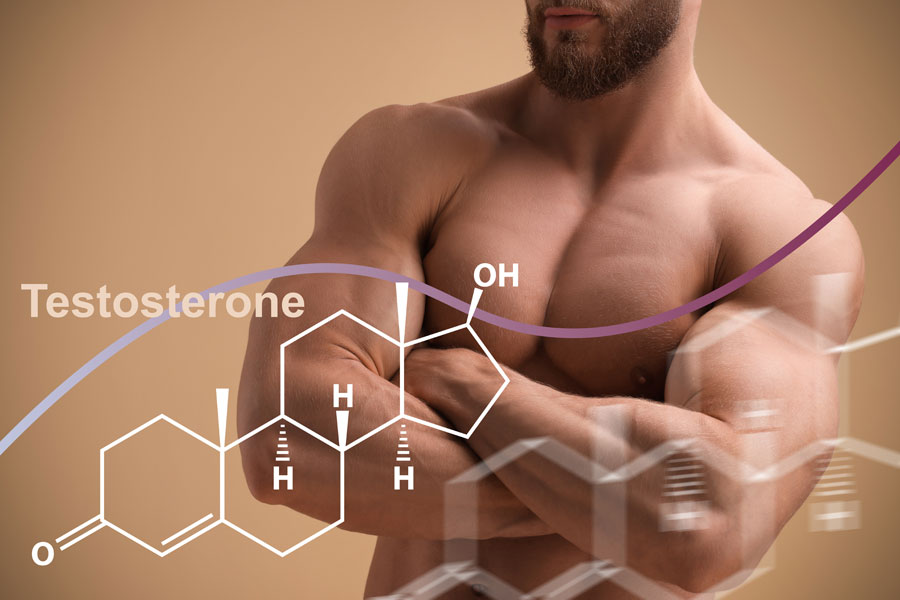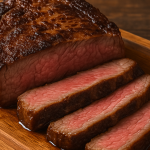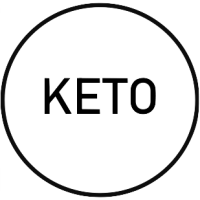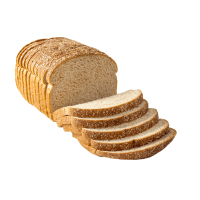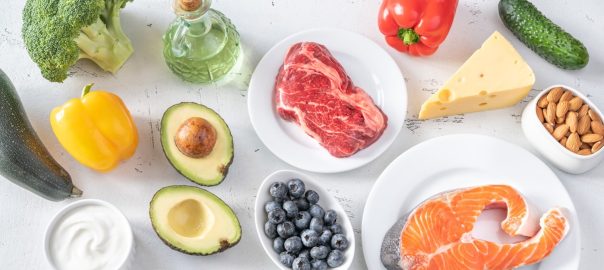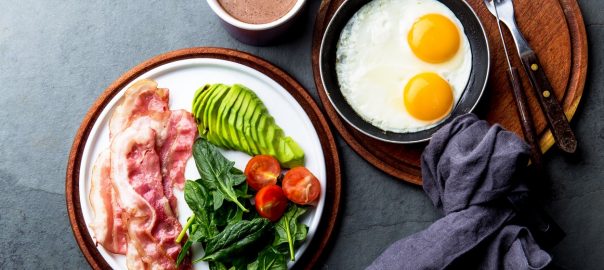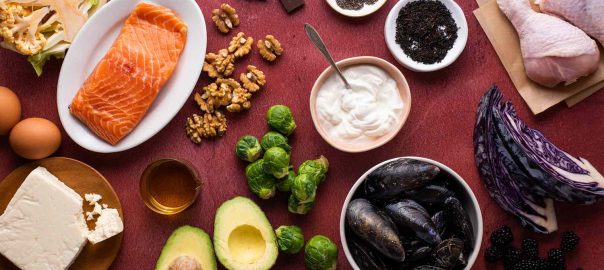Low-Carb for Men’s Health
Optimizing Testosterone and Energy After 30
As men move into their 30s and beyond, they often notice changes in energy, muscle mass, mood, and libido. What many don’t realize is that these shifts are commonly tied to declining testosterone and metabolic changes brought on by aging. For men looking to take control of their health naturally, diet is one of the most powerful tools—and low-carb nutrition is quickly emerging as a top choice.
But how exactly does a low-carb diet help men over 30 feel stronger, sharper, and more energized? In this article, we answer the most common questions about testosterone optimization, energy, muscle maintenance, and hormonal balance through the lens of low-carb eating. We also offer practical food choices, sample meals, and supplement tips to help you thrive.
What Happens to Testosterone and Energy After Age 30?
After the age of 30, testosterone levels typically begin to decline at a rate of about 1% per year, often leading to noticeable changes in male health. This natural decline can affect everything from muscle mass and energy levels to libido and mood. While it’s a normal part of aging, lifestyle choices—including nutrition—can accelerate or slow this process.
Men may experience symptoms such as fatigue, reduced strength, weight gain (especially around the belly), decreased motivation, and sexual health changes. These aren’t just uncomfortable—they can signal deeper hormonal imbalances that deserve attention. Fortunately, studies show that changes in dietary habits can significantly impact testosterone levels and related symptoms, and that’s where low-carb eating becomes a game-changer.
How Does Diet Impact Hormonal Health in Men?
Diet plays a critical role in hormone production, signaling, and balance—especially for testosterone. The types of food you eat can either support your body’s hormonal environment or disrupt it.
For example, diets high in refined carbs and sugars tend to increase insulin resistance and chronic inflammation, both of which suppress testosterone production. Excess body fat, especially visceral fat around the abdomen, can also convert testosterone into estrogen through an enzyme called aromatase. This worsens hormonal imbalances over time.
On the flip side, a low-carb diet can reduce inflammation, improve insulin sensitivity, support healthy body fat levels, and ensure your body has the nutritional building blocks it needs to produce testosterone naturally. That’s why a growing number of men are turning to low-carb and ketogenic approaches to stay lean, strong, and energized.
Can a Low-Carb Diet Really Boost Testosterone?
Yes—emerging research shows that low-carb diets can support higher testosterone levels, particularly in overweight or insulin-resistant men. These diets are especially effective at helping men lose belly fat and reduce insulin levels, both of which are directly linked to better testosterone production.
One clinical trial found that men on a low-carb diet experienced a 25% increase in testosterone over 12 weeks, compared to just 12% in the low-fat group. This effect was especially pronounced in those who lost more visceral fat and improved insulin sensitivity.
By reducing carbohydrates, you minimize blood sugar spikes, decrease insulin resistance, and encourage the body to switch to fat-burning mode. All of these physiological shifts create a better hormonal environment for testosterone, DHEA, and other key androgens to thrive.
How Does Low-Carb Eating Improve Energy and Mental Focus?
Low-carb diets help maintain steady energy levels throughout the day by preventing the blood sugar crashes that come from eating high-carb meals. If you’ve ever felt sluggish an hour after lunch, you’ve likely experienced reactive hypoglycemia, where your body overshoots insulin and leaves you drained.
When you switch to low-carb eating, your body becomes more efficient at burning fat for fuel, producing ketones that serve as a cleaner, more sustainable energy source. This can lead to enhanced mental clarity, improved focus, and a significant reduction in afternoon fatigue or brain fog.
In fact, many men report feeling mentally sharper and more alert on a low-carb or ketogenic plan, especially when paired with intermittent fasting or nutrient-dense meals.
What’s the Right Balance of Protein and Fat for Hormonal Health?
To optimize hormonal health on a low-carb diet, it’s essential to balance protein and fat intake correctly. Too little protein can lead to muscle loss and reduced metabolic rate, while too much can increase cortisol or inhibit ketosis (if that’s your goal).
A good target for most men is 1.2 to 2.0 grams of protein per kilogram of body weight, depending on their level of physical activity. This supports muscle repair, testosterone production, and metabolic function. High-quality protein sources like grass-fed beef, pasture-raised eggs, wild-caught fish, and whey protein supplements are ideal.
Healthy fats are equally important. Testosterone is synthesized from cholesterol, meaning your body needs adequate fat to maintain optimal levels. Prioritize fats from:
- Avocados
- Extra virgin olive oil
- Fatty fish like salmon
- Coconut oil
- Nuts and seeds
Avoid trans fats and highly processed seed oils, which can disrupt hormone signaling and promote inflammation.
Can Men Over 30 Build or Maintain Muscle on a Low-Carb Diet?
Yes, men can absolutely build and maintain muscle while following a low-carb lifestyle—as long as they get enough protein and strength train regularly. In fact, a low-carb approach may even improve body composition, helping men lose fat while preserving lean muscle mass.
Ketogenic and low-carb diets help maintain insulin sensitivity, which is crucial for nutrient partitioning and muscle building. Some research also suggests that being in ketosis may elevate growth hormone (GH) and support more efficient recovery after workouts.
The key is to combine low-carb eating with resistance training, such as weight lifting or bodyweight exercises, at least 3–4 times per week. This synergistic approach supports testosterone levels, enhances strength, and helps keep metabolism high.
What Are the Best Low-Carb Foods for Supporting Male Hormones?
Certain foods are particularly rich in nutrients that support testosterone production and male vitality. Here are the best low-carb, hormone-friendly options:
| Food | Nutrients |
| Eggs (whole) | Cholesterol, vitamin D, choline |
| Grass-fed beef | Zinc, iron, saturated fat |
| Salmon & sardines | Omega-3s, selenium, vitamin D |
| Spinach & kale | Magnesium, vitamin K, antioxidants |
| Pumpkin & chia seeds | Zinc, magnesium, omega-3s |
| Avocados | B vitamins, healthy fats |
| Full-fat Greek yogurt | Protein, probiotics |
| Brazil nuts | Selenium, a key testosterone cofactor |
| Low-carb protein bars | Quick post-workout fuel—check out Quest or GoodTo Go |
What Might a Full Day of Low-Carb Eating Look Like for Men?
Here’s a sample meal plan designed to support testosterone, energy, and muscle maintenance:
Breakfast
- 3 pasture-raised eggs scrambled in butter
- 2 slices of Carbonaut low-carb toast
- 1/2 avocado
- Coffee with MCT oil or heavy cream
Lunch
- Grilled chicken thighs over arugula and kale
- Dressing: olive oil, lemon juice, garlic
- 1 oz of pumpkin seeds
- Sparkling water
Dinner
- Grass-fed ribeye or salmon filet
- Roasted Brussels sprouts and cauliflower
- Cauliflower mash with herbs and ghee
Post-Workout
- Whey protein shake (sweetened with stevia)
- Handful of almonds or walnuts
Evening Snack
- GoodTo Go bar
- Herbal tea with magnesium supplement
All products mentioned are available through Low Carb Grocery, Canada’s leading source for high-quality low-carb foods.
Are There Supplements That Can Help Boost Testosterone Naturally?
While diet should be the foundation, supplements can help fill in nutritional gaps and optimize hormonal health:
| Supplement | Role |
| Zinc | Vital for testosterone synthesis |
| Magnesium | Supports energy, sleep, and hormone balance |
| Vitamin D3 | Commonly low in men; supports testosterone |
| Ashwagandha | Reduces cortisol, shown to raise testosterone in men |
| Omega-3 fish oil | Fights inflammation, supports cell health |
| Creatine monohydrate | Boosts muscle strength, may improve androgen levels |
| Boron | A trace mineral linked to higher free testosterone |
Always choose third-party-tested supplements and consult your doctor before starting any new regimen—especially if you have underlying conditions or are taking medications.
What Are Common Mistakes Men Make on Low-Carb Diets When Trying to Boost Testosterone?
Many men adopt low-carb eating to improve energy and hormones—but unknowingly fall into traps that sabotage their progress. So what common low-carb mistakes could harm testosterone rather than help it?
One of the most frequent issues is not eating enough overall. While weight loss is a key driver for testosterone improvement, excessively low calorie intake can signal stress to the body, elevating cortisol and suppressing hormone production. It’s essential to eat enough nutrient-dense foods to support metabolism, training, and hormone balance.
Another mistake is going too low in fat. Since cholesterol is the raw material for testosterone synthesis, skimping on fats can create deficiencies. Men sometimes fear fat or focus too much on lean proteins without pairing them with healthy fats like olive oil, egg yolks, or grass-fed butter.
Also, some low-carb eaters fail to get enough micronutrients, such as zinc, magnesium, selenium, and vitamin D—nutrients critical to testosterone regulation. Prioritize whole foods like seafood, leafy greens, nuts, and seeds, and consider supplementation where needed.
Finally, chronic keto dieting without carb cycling or refeeds can negatively affect some men’s thyroid function or stress levels. For long-term hormone health, many experts suggest incorporating strategic carb refeeds (from low-glycemic sources like sweet potatoes or berries) on heavy training days to help regulate leptin, insulin, and thyroid hormones.
Can Intermittent Fasting Help with Testosterone and Energy?
Yes—when used wisely, intermittent fasting (IF) can support testosterone and energy regulation in men. But how does it work?
Intermittent fasting naturally lowers insulin levels and promotes growth hormone (GH) secretion, both of which play supportive roles in testosterone function. During fasting windows, your body also becomes more insulin sensitive, aiding in nutrient partitioning and fat burning—two factors tied to hormone health.
Some studies suggest that fasting can increase LH (luteinizing hormone), which stimulates testosterone production in the testes. Additionally, fasting helps reduce inflammation, improve gut health, and streamline calorie intake—all of which contribute to a healthier metabolic and hormonal profile.
That said, IF isn’t a magic bullet. If done too aggressively or combined with excessive stress, it may lead to elevated cortisol, which works against testosterone. Start with a gentle 12–14 hour fast overnight, and gradually experiment with 16:8 or 18:6 protocols if your energy, sleep, and workouts remain strong.
What Lifestyle Habits Should Men Pair with Low-Carb to Maximize Results?
Optimizing male health goes beyond diet. So what lifestyle habits can further boost testosterone and vitality for men over 30?
- Prioritize Sleep
Poor sleep is one of the biggest testosterone killers. Just one week of restricted sleep can lower testosterone by up to 15%. Aim for 7–9 hours of quality sleep per night, ideally going to bed before midnight.
- Strength Train Consistently
Resistance training 3–5 times per week is a potent natural testosterone booster. Compound lifts like squats, deadlifts, bench presses, and pull-ups stimulate testosterone release and promote lean muscle growth.
- Manage Stress
Chronic stress leads to elevated cortisol, which competes with testosterone and disrupts hormonal balance. Incorporate stress-reducing practices such as breathwork, mindfulness, nature walks, or cold showers.
- Limit Alcohol
Excessive alcohol consumption lowers testosterone and impairs liver detoxification. Moderate intake—such as an occasional glass of dry red wine—is fine, but frequent or heavy drinking undermines your goals.
- Get Sunlight Daily
Vitamin D3 from sun exposure is one of the easiest ways to support testosterone. Aim for at least 15–20 minutes per day on bare skin (arms and face), or supplement with 2000–5000 IU daily if you live in northern climates.
Frequently Asked Questions (FAQs)
Can a low-carb diet reduce estrogen levels in men?
Yes. By reducing body fat—especially visceral fat—low-carb diets decrease the conversion of testosterone into estrogen via aromatase. This helps balance androgen-to-estrogen ratios naturally.
How long does it take to see testosterone improvements on a low-carb diet?
Many men begin to see noticeable improvements in energy, libido, and strength within 4–12 weeks, especially if they lose body fat and improve sleep and training habits during that time.
Is it safe to do keto long-term for men’s hormone health?
Yes, but it depends on the individual. Some men thrive on long-term ketogenic eating, while others benefit from carb cycling or seasonal adjustments. Monitor energy, sleep, and libido for feedback. Consider labs for testosterone, free T, and thyroid function if unsure.
What low-carb snacks are best for supporting testosterone?
Snacks rich in healthy fats and micronutrients are ideal. Examples include:
- Hard-boiled eggs
- Brazil nuts (for selenium)
- Tuna or salmon pouches
- Low-carb jerky
- Greek yogurt with pumpkin seeds
- Keto-friendly protein bars with added zinc or magnesium
Final Thoughts: Is Low-Carb the Right Choice for Men Over 30?
For many men over 30, adopting a low-carb diet can be one of the most effective ways to reclaim energy, support testosterone, and maintain muscle. By choosing nutrient-dense, high-quality foods and dialing in macronutrient balance, men can slow the effects of aging and feel more energized and vital.
Whether your goal is more strength in the gym, sharper focus at work, or a stronger sense of overall well-being, low-carb nutrition offers a simple and sustainable way to enhance male health at every level.
Start building your low-carb foundation today with premium products from Low Carb Grocery—and take back your energy, strength, and vitality.
More Low Carb Lifestyle Articles
Top Snack Foods
Discover the ultimate guide to keto and low carb snacking! We’ve compiled our favourite snacks and sweets that are both delicious and diet friendly! From chocolatey treats to savoury bites, we’ve got something for everyone!
Zero Carb Foods
Maintaining a low carb diet can be challenging, but with the right foods, it doesn’t have to be. This article is packed with product recommendations to help you stay on course. Discover how to fully embrace a keto or low carb diet with delicious meals that satisfy every craving.
Is Going Low Carb Healthy?
Interested in making the switch to a low carb diet but worried about adverse health effects? Learn more about the role that carbs play in your diet and how they affect your overall health and fitness goals to determine if a low carb diet is the right choice for you.
30 Low Carb Foods
Looking for delicious and satisfying meals that fit into your low carb lifestyle? Explore our list of 30 healthy low carb foods, including pantry staples and specialty products.
Getting Started with Keto
The keto diet, as it is commonly known, has surged in popularity due to the dramatic results that people have experienced. However, there remains some skepticism about how it works from those who are new to high-fat and high-protein eating. Learn more about this diet here.





